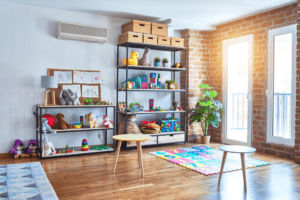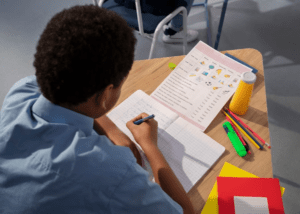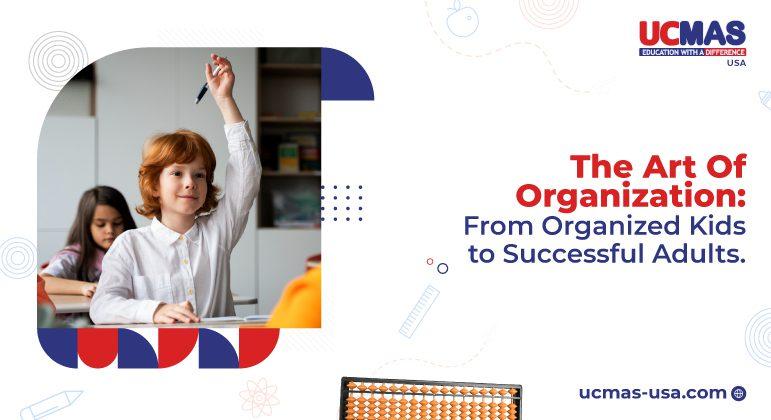Kids don’t have to be organized, organization is for adults! Before you believe that statement, travel back to the time when you stepped on Lego or searched for a lost book for hours. We bet it stresses you out even now, just thinking about it. That’s exactly why organization is an important skill to develop from childhood. In today’s fast-paced, technology-driven world, finding time to get your kids organized can be challenging. But we are here to help.
If you want to develop organizational skills in your children, your approach is key. Their acceptance of this new regimen depends on how you introduce them to it.
Here are 7 proven strategies that will help you introduce your child to their bff – organization!
The 7 Hows of Getting Your Child Organized
1. Start Early
Introduce your child to the importance of organization at an early age. Start small by assigning them tasks like clearing away toys, neatly stacking their books, putting away their used clothes in the laundry bin, etc. Include these tasks in their daily routine so that they grow accustomed to them.
Consistency is key when trying to instill organization in your kids.
A consistent routine of these small tasks will help your child understand expectations and make organization a natural part of their day.
2. Guide Them Using Visual Cues
Visual aids are extremely useful for helping kids stay organized. Colorful checklists and charts help remind them of their activities and routines for the day. Remember to include pictures while making these charts for younger children, who might still not be able to read. These visual cues serve as a gentle reminder and make it easier for kids to follow through on their commitments.
3. Smaller Tasks Are Easier
Big tasks like cleaning their room can be overwhelming for kids (sometimes for adults as well!) exclaims Pooja Sundar, a parent and UCMAS Course Instructor.
She further advises that instead of assigning kids such tasks, break them down into smaller ones they complete as part of their daily routine. For example, they can keep their room tidy by stacking their toys, organizing their bookshelf, and tidying up their desk space. These smaller tasks are less time-consuming but are a step in the right direction.
4. Designated Spaces Save Time
Having designated spaces for all your child’s belongings will help them organize better and faster. Ensure your child is familiar with the separate designated spaces for items such as books, toys, school supplies, and stationery. Encourage them to participate while creating these spaces, and use colorful bins, shelves, and labels to help them remember.

You can also use the Three-Box Method for organizing. Set up three boxes labeled “keep,” “donate,” and “sell.”
You can indulge in a fun activity with the kids helping them sort through their belongings and decide which category each item belongs to. This method teaches them important lessons of de-cluttering and letting things go that they no longer need.
5. Provide Positive Reinforcement
Positive reinforcement goes a long way toward encouraging good behavior. Recognize and reward your child’s efforts at staying organized. The reinforcement could be as simple as pinning a star on their organization board or a fun family pizza outing for consistently staying organized. Positive reinforcement reinforces the importance of organization and motivates your child to continue practicing their newfound skill.
6. Lead By Example
Children are heavily influenced by their surroundings. You can be their role model by showcasing your good organizational habits. Allow your child to witness you tidying up your space, sorting through belongings, and maintaining a clutter-free environment at home. This not only sets a positive example but also educates them that organization is a skill that goes a long way.
7. Encourage Them to Plan Ahead
Create schedules and checklists with your child to help them plan their routine. You can begin by planning their daily or weekly schedule, which includes school activities, after-school activities, playtime, and other activities. Planning the schedules with your child will help them understand the importance of the time allotted to each activity, and how to handle any change if it comes their way. Because they created the calendar, they will be more willing and motivated to follow it. This simple planning activity, once perfected by your child, will benefit him greatly in the future.

Add these 7 strategies to your parenting toolkit to instill the importance of organization in your kids. Remember, developing organizational skills takes time and patience, so make sure you celebrate their progress at each step.
Why does Organization Matter?
Introducing a schedule among kids, especially one that involves organization, can be difficult. But is it worth the time and effort? Now that you have a strategy in place with the six hows, here is some motivation for you to cultivate this important skill among your children.
- Organization is an invaluable skill that will set your child up for success throughout their lives. From managing their time effectively to maintaining tidy homes and workspaces, these skills go a long way.
- The art of organizing helps one de-stress, and by instilling this skill in your little one, you’re also gifting them peace of mind.
- Teaching your kids to be organized isn’t just about tidying up. While decluttering and organizing their space, they learn to make decisions and manage their time effectively. This adds a sense of independence and confidence to tackle any tasks in the future.
- Being organized not only helps your kids to stay on top of things but also boosts their focus and memory.
- An Organized lifestyle teaches your children to prioritize tasks, manage time, and stay on top of their obligations. These abilities go beyond organization alone and can positively affect every part of their lives.
- Teaching children to arrange and look after their possessions instills respect and accountability in them. They develop a sense of appreciation and care for their belongings, rather than losing or damaging them amidst a pile of mess.
How Can UCMAS Abacus Classes Help?
At UCMAS Abacus classes, we understand the profound impact of these organizational abilities, which is why we heavily focus on cultivating skills like observation, judgment, decision-making, and problem-solving in children.
Our ultimate goal is to equip children with the mental discipline and different cognitive skills that will be like a toolkit for their lifelong success!
Start your child’s journey towards leading an organized and successful life with the UCMAS abacus math classes.


